Important Questions for Class 8 Science - Crop Production and Management
Q1: Give four examples of fertilizers.
Ans: Urea, ammonium sulphate, superphosphate, potash, NPK etc.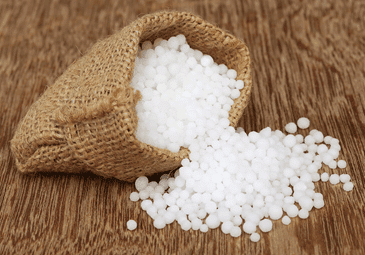
Q2: What do you mean by the term irrigation?
Ans: Irrigation is a method used to supply water to plants in a consistent way. The timing and frequency of irrigation can change based on various factors:
- The type of crop being grown.
- The type of soil that is present.
- The specific season during the year.
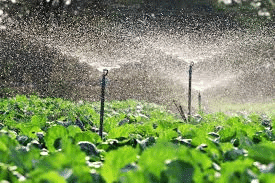
Q3: If a handful of seeds are given to you, how will you separate healthy seeds from damaged ones?
Ans: Fill a beaker halfway with water, add some seeds into it, and mix well. Set alone for a while. You'll notice that some seeds sink while others float. Damaged seeds become hollow and lighter, which allows them to float on water.
Q4: Describe briefly animal husbandry?
Ans:
- Animal husbandry is a branch of agriculture focused on the care and management of animals that provide meat, fiber, milk, or eggs.
- This field includes daily care, selective breeding, and the overall keeping of livestock.
- Just like plants, animals are raised for a variety of food products that humans use, either for personal consumption or for sale.
- Proper animal husbandry involves providing animals with sufficient food, housing, and care.
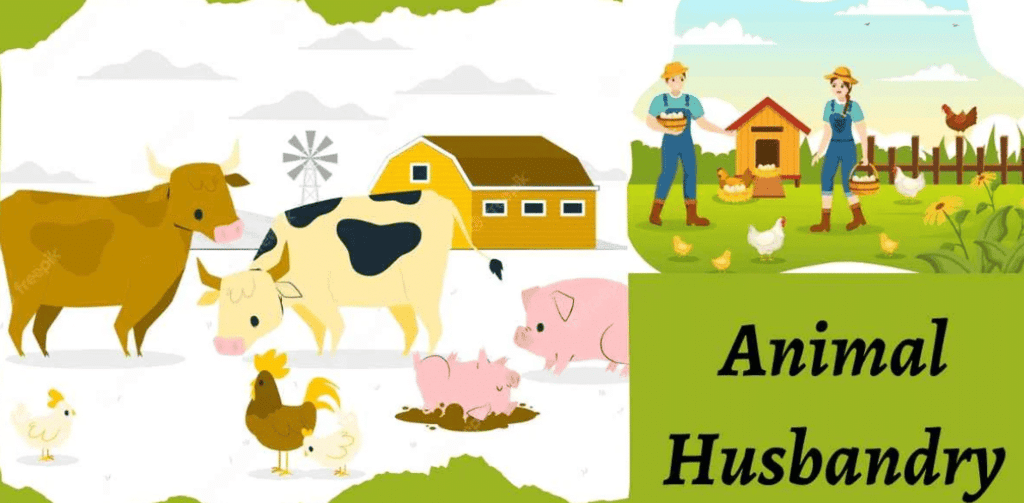
Q5: What is crop rotation? Why is it important?
Ans: Crop rotation is a way of restoring nutrients in the soil by planting various crops in order. Growing legumes as fodder one season and wheat the next is one example. It is significant because it aids in nitrogen replenishment in the soil.
Q6: List the advantage of manure over fertilizers.
Ans:
- The water holding capacity of the soil improves by Manure.
- The texture of the soil improves by Manure.
- The number of friendly microbes increases by Manure.
Q7: Define harvesting.
Ans: The cutting of mature crops manually or by machines is known as Harvesting. Harvesting of crops can be done either by pulling out the crops from the field or cutting them close to the ground. In our country, Harvesting is either done by sickle or by a harvester machine.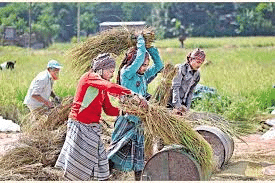
Q8: Explain in detail about agricultural implements used during the preparation of soil.
Ans: The main tools used for this purpose are plough, hoe, and cultivator.
Plough: A plough is a tool made of wood or iron that is used to till or plough a field.
Apart from tilling the soil, it is utilized for a variety of tasks such as crop fertilizing process, clearing weeds, and so on. A pair of bulls or other animals, such as camels or horses, pull this tool.
Hoe: A hoe is a basic instrument that is used to pull weeds from the soil and soften the soil. It has a long wooden or iron rod. A blade-like device is attached to one of its ends by a strong, wide, and bent plate of iron. Animals drag it along.
Cultivator: Nowadays, a tractor-driven cultivator is used to plough. The usage of a cultivator saves both time and labour.
Q9: Why is the storage of produce important? Briefly describe the methods involved.
Ans: Storing produce is essential because:
- If grains are harvested and need to be stored for a long time, they must be kept safe from moisture, insects, rodents, and microbes.
- Grains that have been harvested tend to have a higher level of moisture. If these grains are not dried properly before storage, they can spoil or become infected by organisms, making them unusable or unable to sprout. Therefore, it is important to dry the grains in the sun before storing them to reduce moisture content. This process helps to keep away insects, pests, bacteria, and fungus.
- Farmers typically use jute bags or metal bins for storing their crops. For larger quantities of grain storage, silos and granaries are used to keep pests like rodents and insects at bay.
- At home, dried neem leaves are often used to help store food grains.
- To protect large amounts of grains stored in big warehouses from pests and microbes, special chemical treatments are needed.
Q10: Write a short note on the following modern methods of irrigation.
a) Sprinkler system
Ans:
- This technique is especially useful for uneven land where there is not enough water available.
- At regular intervals, pipes that run perpendicular to the main pipeline are equipped with revolving nozzles on top.
- Water is pushed through these nozzles when it flows under pressure through the main pipe, aided by a pump.
- The water is then sprayed over the crops in a manner similar to sprinkling.
- Sprinklers are particularly beneficial for maintaining lawns, coffee plantations, and many other types of crops.
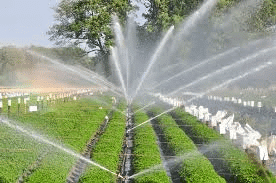
b) Drip Irrigation system
Ans: The water falls exactly near the roots in this arrangement, drop by drop. As a result, it's known as a drip system. It is the most effective method for watering fruit trees, gardens, and trees since no water is wasted. It's a gift in areas where there's a shortage of water.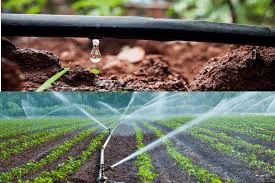
|
92 videos|419 docs|44 tests
|
FAQs on Important Questions for Class 8 Science - Crop Production and Management
| 1. What is crop production and management? |  |
| 2. What are the important steps involved in crop production? |  |
| 3. How can one improve crop production? |  |
| 4. What are the different methods of irrigation used in crop production? |  |
| 5. Why is pest and disease management important in crop production? |  |

















